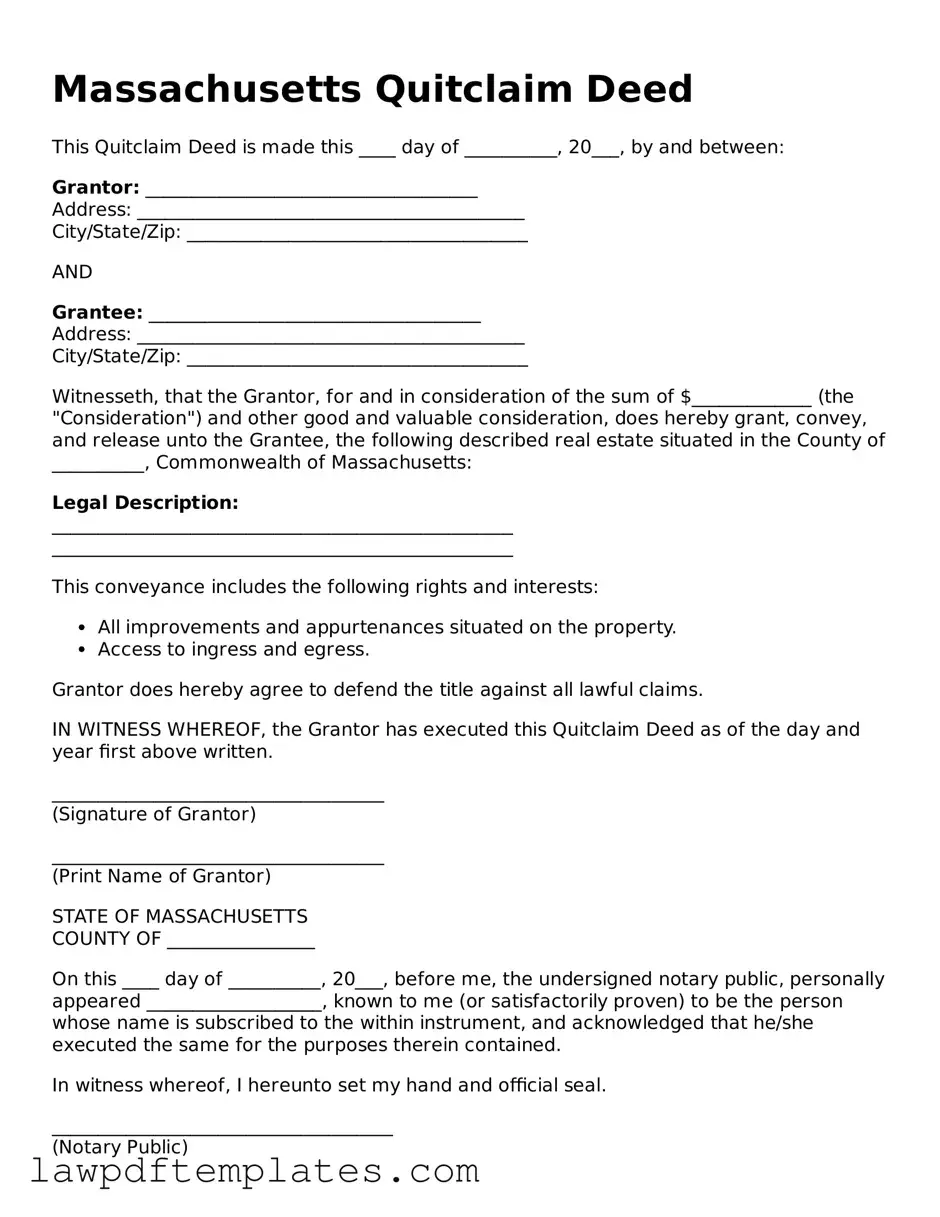Free Quitclaim Deed Template for the State of Massachusetts
Form Breakdown
| Fact Name | Description |
|---|---|
| Definition | A quitclaim deed is a legal document used to transfer ownership of real estate from one party to another without any warranties regarding the title. |
| Governing Law | In Massachusetts, quitclaim deeds are governed by Massachusetts General Laws, Chapter 183, Section 15. |
| Usage | This type of deed is often used in situations such as transferring property between family members or clearing up title issues. |
| Consideration | While a quitclaim deed can be executed without monetary consideration, it is common to include a nominal amount to validate the transaction. |
| Filing Requirements | The completed quitclaim deed must be recorded at the local Registry of Deeds to ensure the transfer is legally recognized. |
Sample - Massachusetts Quitclaim Deed Form
Massachusetts Quitclaim Deed
This Quitclaim Deed is made this ____ day of __________, 20___, by and between:
Grantor: ____________________________________
Address: __________________________________________
City/State/Zip: _____________________________________
AND
Grantee: ____________________________________
Address: __________________________________________
City/State/Zip: _____________________________________
Witnesseth, that the Grantor, for and in consideration of the sum of $_____________ (the "Consideration") and other good and valuable consideration, does hereby grant, convey, and release unto the Grantee, the following described real estate situated in the County of __________, Commonwealth of Massachusetts:
Legal Description:
__________________________________________________
__________________________________________________
This conveyance includes the following rights and interests:
- All improvements and appurtenances situated on the property.
- Access to ingress and egress.
Grantor does hereby agree to defend the title against all lawful claims.
IN WITNESS WHEREOF, the Grantor has executed this Quitclaim Deed as of the day and year first above written.
____________________________________
(Signature of Grantor)
____________________________________
(Print Name of Grantor)
STATE OF MASSACHUSETTS
COUNTY OF ________________
On this ____ day of __________, 20___, before me, the undersigned notary public, personally appeared ___________________, known to me (or satisfactorily proven) to be the person whose name is subscribed to the within instrument, and acknowledged that he/she executed the same for the purposes therein contained.
In witness whereof, I hereunto set my hand and official seal.
_____________________________________
(Notary Public)
My Commission Expires: ___________
Common mistakes
Filling out a Massachusetts Quitclaim Deed form can be straightforward, but many people make common mistakes that can lead to complications. One frequent error is failing to include all required information. This includes the names of both the grantor (the person transferring the property) and the grantee (the person receiving the property). Omitting even one name can render the deed invalid.
Another mistake is not properly identifying the property being transferred. It’s essential to provide a clear and accurate description of the property. This usually includes the address and a legal description. Inaccuracies can create confusion and may lead to disputes in the future.
People often overlook the necessity of signing the deed in front of a notary public. A signature without notarization can invalidate the document. It’s crucial to ensure that the signing process is completed correctly to avoid any legal issues later on.
Additionally, many individuals forget to check for any outstanding liens or mortgages on the property before completing the deed. If there are existing financial claims against the property, these must be addressed prior to transferring ownership. Ignoring this can lead to financial liability for the new owner.
Another common error is not recording the Quitclaim Deed with the appropriate local government office. Failing to file the deed means that the transfer of ownership may not be recognized legally, which can cause problems down the line. It’s important to ensure that the deed is properly recorded to protect the interests of both parties.
Some people also misinterpret the implications of a Quitclaim Deed. Unlike other types of deeds, a Quitclaim Deed does not guarantee that the grantor holds clear title to the property. This misunderstanding can lead to disputes if the grantee assumes they are receiving a property free of any issues.
Another mistake is not providing adequate consideration. While a Quitclaim Deed can be executed without a monetary exchange, it’s still important to state any consideration, even if it’s a nominal amount. This helps clarify the intent of the transaction.
Many individuals fail to include a date on the deed. A missing date can create ambiguity regarding when the transfer took place, which can complicate legal matters later. Always ensure that the deed is dated properly.
Lastly, people sometimes neglect to consult with a legal professional or a real estate expert. While it may seem like a straightforward process, having guidance can help avoid these common pitfalls. Professional advice can provide peace of mind and ensure that the deed is executed correctly.
Discover More Quitclaim Deed Templates for Specific States
How to Gift Land to Family Member - It is important to ensure that the granter has the legal right to transfer the property.
To facilitate the ownership transfer process, you may want to utilize the services provided by PDF Documents Hub, which offers a streamlined way to access and complete the Trailer Bill of Sale form efficiently and effectively.
Warranty Deed - Quitclaim Deeds are commonly used to remove a co-owner from property title.
What Does a Deed Look Like in Nj - While it is straightforward, legal advice is recommended for complicated transactions.
